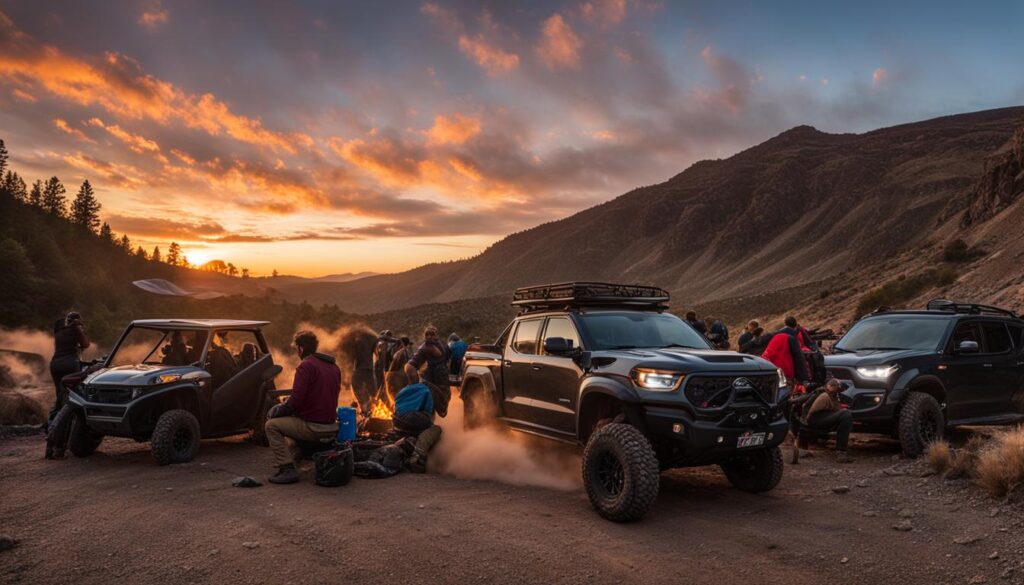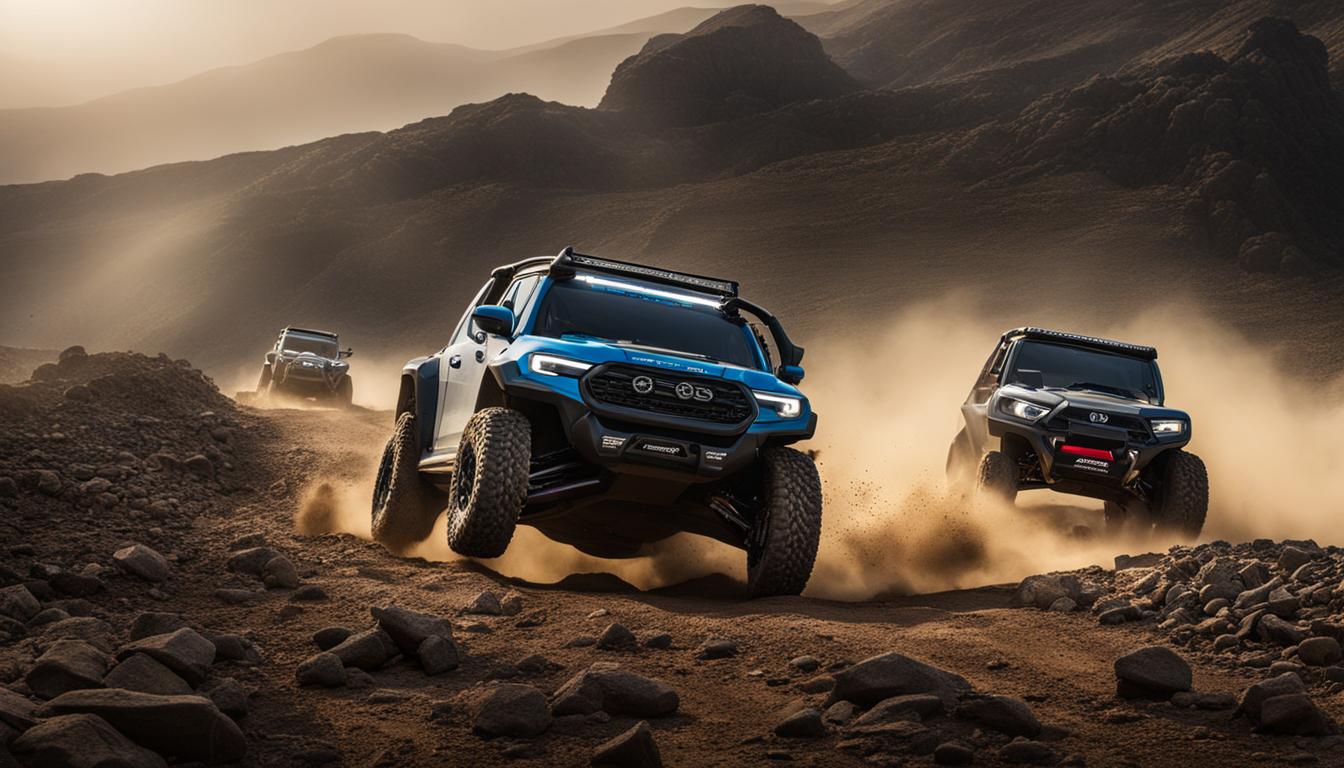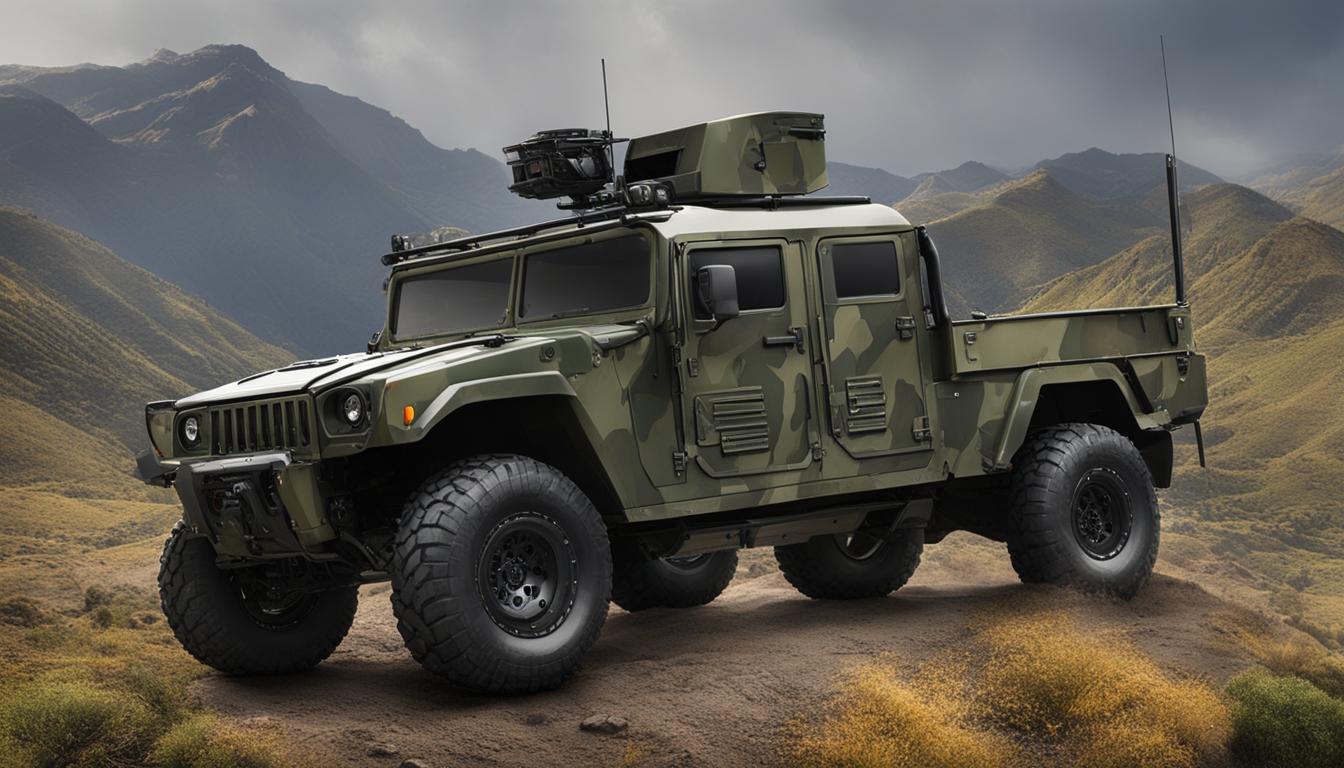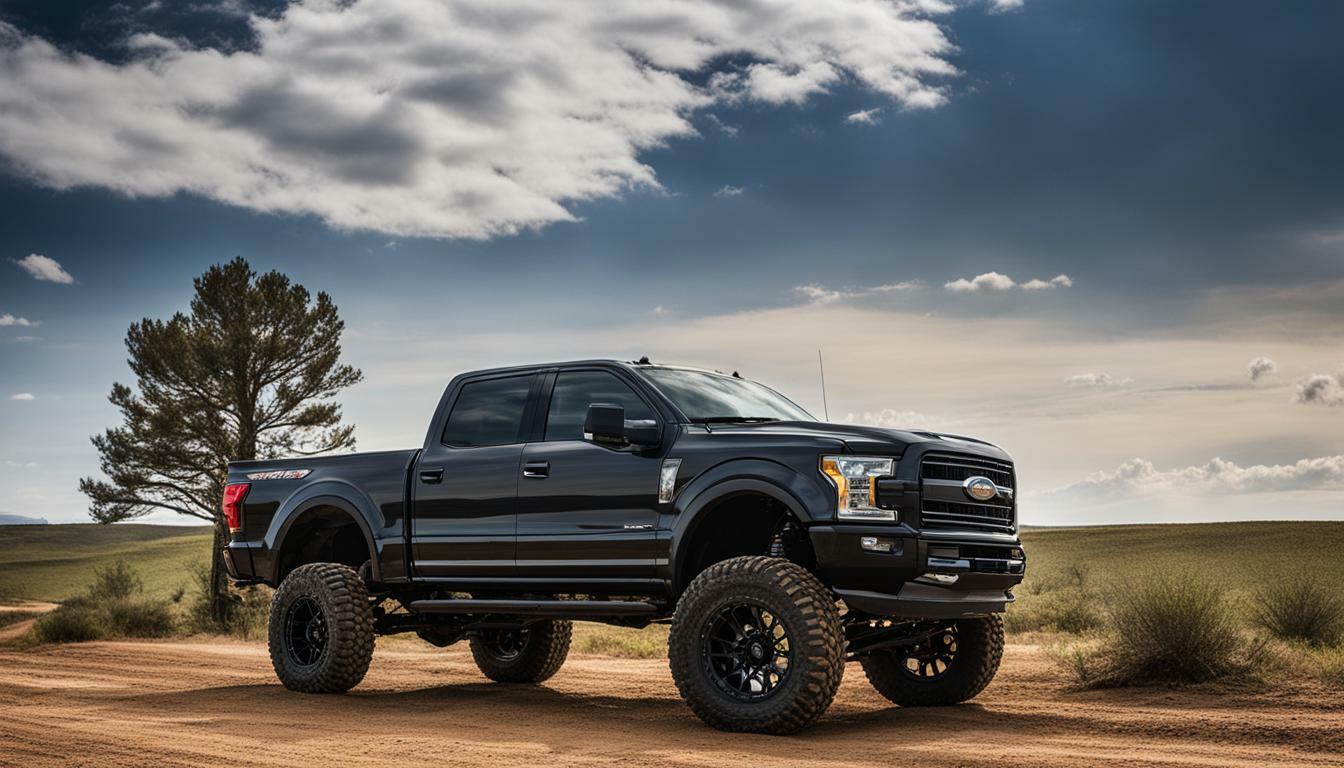Off-roading is a thrilling activity that allows individuals to explore unpaved terrains and experience the excitement of off-road driving. There are two main categories of off-roading: recreational and professional. While they both involve off-road vehicles and activities, there are distinct differences between the two.
Recreational off-roading is all about leisure drives and enjoying the off-road experience with unmodified vehicles. It is a popular pastime for enthusiasts who seek adventure and want to test their driving skills. On the other hand, professional off-roading revolves around competitions and requires specialized vehicles and professional drivers. It involves intense off-road racing and challenges that push the limits of both the vehicles and the drivers.
Recreational off-roading allows individuals to enjoy the great outdoors, explore scenic landscapes, and experience the thrill of conquering off-road obstacles. Professional off-roading, on the other hand, offers a highly competitive environment where drivers showcase their skills and vehicles are pushed to their limits.
Whether you are interested in casual off-road adventures or aspire to be a professional off-road racer, understanding the difference between recreational and professional off-roading is essential. It helps you choose the right type of off-roading activity that aligns with your preferences and goals.
Key Takeaways:
- Off-roading can be categorized into recreational and professional off-roading.
- Recreational off-roading involves leisure drives with unmodified vehicles.
- Professional off-roading includes competitions with customized vehicles and professional drivers.
- Recreational off-roading offers a fun and adventurous experience.
- Professional off-roading provides intense competition and challenges.
Types of Off-Roading Vehicles
Off-roading enthusiasts have a wide range of vehicles to choose from, each designed to tackle different terrains and offer unique experiences. Here are some common types of off-road vehicles:
SUVs
Sport Utility Vehicles (SUVs) are popular choices for off-roading due to their versatility and capability. They typically feature four-wheel drive systems, rugged suspensions, and higher ground clearance, allowing them to navigate through rough terrain with relative ease. SUVs offer ample space for passengers and cargo, making them suitable for both recreational off-roading and everyday use.
Trucks
Trucks are known for their durability and towing capacity, making them excellent choices for off-roading. They can be equipped with features such as locking differentials and off-road tires to enhance their performance in challenging conditions. Trucks often have larger cargo beds, providing ample space for carrying equipment and gear.
ATVs and UTVs
All-Terrain Vehicles (ATVs) and Utility Terrain Vehicles (UTVs) are compact off-road vehicles designed for one or more occupants. ATVs typically have handlebars for steering and operate in a straddle position, while UTVs resemble small utility trucks with steering wheels and enclosed cabs. These vehicles are nimble and offer excellent maneuverability, making them ideal for navigating tight trails and exploring remote areas.
Dune Buggies
Dune buggies are lightweight off-road vehicles specifically designed for sandy terrain. They feature powerful engines and wide, knobby tires to provide traction on shifting sand dunes. Dune buggies often have open frames or roll cages for safety and offer an exhilarating experience for off-roaders seeking adventure in desert environments.
| Vehicle Type | Terrain Ability | Passenger Capacity | Key Features |
|---|---|---|---|
| SUVs | Good | 5-8 | Four-wheel drive, high ground clearance, spacious interior |
| Trucks | Excellent | 2-6 | Towing capacity, rugged suspension, off-road tires |
| ATVs and UTVs | Superb | 1-4 | Compact size, excellent maneuverability, lightweight |
| Dune Buggies | Specialized for sand | 1-2 | Powerful engine, wide tires, roll cage |
These are just a few examples of off-road vehicles available for enthusiasts. Each vehicle type offers its own advantages and is suited for different off-roading experiences. Whether you prefer the spaciousness of an SUV, the ruggedness of a truck, the nimbleness of an ATV or UTV, or the thrill of a dune buggy, there is a vehicle that will enhance your off-roading adventures.
Off-roading is all about embracing the great outdoors and pushing the limits of what vehicles can do. Whether you choose an SUV, truck, ATV, UTV, or dune buggy, each vehicle brings its unique capabilities to the off-road adventure. So, strap in, put on your gear, and get ready for an adrenaline-pumping ride that will leave you craving for more.
Recreational Off-Roading Activities
Recreational off-roading offers enthusiasts a wide range of activities to experience the thrill of off-road driving. Whether it’s conquering sand dunes, exploring unpaved trails, or navigating through muddy terrain, there’s something for everyone in the world of recreational off-roading.
Dune Bashing
One popular activity in recreational off-roading is dune bashing. This exhilarating adventure involves driving on sand dunes using vehicles like dune buggies and ATVs. With their specialized features and powerful engines, these vehicles are perfect for tackling the steep slopes and sandy surfaces of the dunes. Dune bashing provides an adrenaline-filled experience as drivers navigate the shifting sands and conquer the challenging terrain.
Green Laning
Green laning refers to driving on unpaved roads or trails designated for off-roading. It offers an opportunity to explore scenic off-road routes while enjoying the beauty of nature. Green lanes can vary in difficulty, ranging from easy paths suitable for beginners to challenging trails that require advanced driving skills. This activity allows off-roaders to immerse themselves in the great outdoors and enjoy the freedom of exploring off the beaten path.
Cross-Country Off-Roading
Cross-country off-roading is an exciting activity that involves traversing multiple routes over long distances, combining different types of off-roading. It tests the skills and endurance of off-roaders as they navigate various terrains, including rocky trails, muddy paths, and even water crossings. Cross-country off-roading offers a true adventure, pushing drivers to adapt to different environments and conquer the unknown.
Mudding
For off-roaders seeking a messy and thrilling experience, mudding is the activity of choice. Mudding involves off-roading through muddy terrain, which creates unique challenges and excitement. Vehicles equipped with specialized tires and increased ground clearance are essential for tackling the muddy trails. Mudding tests the driver’s skills in maintaining control, overcoming traction loss, and navigating through deep mud holes. It’s an adrenaline-pumping activity that offers an unforgettable off-roading experience.
In conclusion, recreational off-roading activities such as dune bashing, green laning, cross-country off-roading, and mudding provide enthusiasts with thrilling adventures and opportunities to push the limits of their vehicles and skills. Whether it’s the adrenaline rush of conquering sand dunes, the serenity of exploring unpaved trails, or the excitement of navigating through muddy terrain, recreational off-roading offers something for everyone looking to experience the thrill of off-road driving.
Professional Off-Roading Competitions
Professional off-roading competitions offer adrenaline-fueled excitement and showcase the skills of expert drivers. These competitions encompass various disciplines within off-road racing, including desert racing, rock racing, and rally. Each category presents unique challenges and demands specific vehicle modifications and driving techniques.
Desert Racing
Desert racing is a high-speed off-road competition that takes place in rugged desert terrains. Specialized trucks equipped with powerful engines, reinforced suspensions, and durable off-road tires navigate through sandy dunes, rocky terrain, and long-distance courses. Drivers must possess exceptional control and endurance to maneuver these demanding landscapes.
Rock Racing
Rock racing focuses on navigating treacherous rock formations at high speeds. This discipline requires vehicles with enhanced suspension systems, powerful engines, and reinforced body protection. Drivers must skillfully maneuver their vehicles through tight and challenging rock obstacles while maintaining control and speed.
Rally
Rally off-roading combines racing and off-road challenges on a variety of terrains, including dirt roads, forest trails, and snowy landscapes. This discipline demands versatility and adaptability from drivers and their vehicles. Participants must navigate varied terrain while adhering to time-based stages, showcasing their ability to handle different off-road conditions.
| Competition | Terrain | Vehicle Modifications | Skills Required |
|---|---|---|---|
| Desert Racing | Sand dunes, rough desert terrain | Reinforced suspensions, off-road tires, powerful engines | Endurance, precise control, navigation skills |
| Rock Racing | Treacherous rock formations | Enhanced suspension systems, reinforced body protection | Technical driving skills, control, speed |
| Rally | Dirt roads, forest trails, snowy landscapes | Adapted suspensions, all-terrain tires | Adaptability, navigation, time management |
“Off-road racing is a thrilling and demanding sport that pushes drivers to their limits. The challenges presented by different terrains and obstacles require a combination of skill, precision, and sheer determination. It’s a test of both driver and vehicle, and only the best can conquer the course.”
Professional off-roading competitions showcase the excitement and skill involved in pushing both drivers and vehicles to their limits. Whether it’s the high-speed adrenaline rush of desert racing, the technical expertise required for rock racing, or the versatility demanded by rally off-roading, these competitions offer a thrilling spectacle for both participants and spectators alike.
Skills and Equipment for Off-Roading
Off-roading requires a combination of skills and the right equipment to ensure a safe and enjoyable experience. Whether you’re tackling sandy dunes, rocky trails, or muddy terrain, having the necessary skills and equipment is essential. Here are some key considerations for off-roaders:
Off-Roading Skills
Mastering off-roading skills is crucial for navigating various terrains effectively. Throttle control plays a vital role in maintaining traction and avoiding wheel spin. Understanding steering techniques, such as counter steering and proper turning angles, can help you maneuver through tight spots and challenging obstacles. Additionally, learning to read and interpret different types of terrain will allow you to make informed decisions during your off-roading adventure.
Off-Roading Terrain
Off-roading terrain can vary significantly, from sandy beaches to rocky mountainsides. It’s important to understand the terrain you’ll be encountering and how it may impact your vehicle’s performance. For example, softer terrains like sand require proper tire pressure adjustments to maximize traction, while rocky trails may necessitate careful line selection to avoid damage to your vehicle’s undercarriage. Being prepared for the specific terrain you’ll be off-roading on will help you stay in control and avoid potential obstacles.
Off-Roading Safety
Safety should be a top priority when off-roading. Wearing appropriate safety gear, such as helmets and protective clothing, can minimize the risk of injury in case of an accident. It’s also essential to follow basic safety guidelines, such as never off-roading alone and informing someone about your off-roading plans. Additionally, performing regular vehicle maintenance and inspections will help identify any potential issues that could compromise your safety during off-roading excursions.
Off-Roading Equipment
Having the right equipment can enhance your off-roading experience and improve safety. Equipment such as winches can help you recover your vehicle in case of a stuck situation, while off-road tires provide better traction and control off-pavement. Other essential off-roading equipment includes recovery gear like tow straps, shackles, and a first aid kit. Investing in quality off-roading equipment will not only enhance your off-roading capabilities but also ensure you’re prepared for any challenges that may arise on the trail.
| Off-Roading Skills | Off-Roading Terrain | Off-Roading Safety | Off-Roading Equipment |
|---|---|---|---|
| Throttle control | Sandy dunes | Wearing safety gear | Winches |
| Steering techniques | Rocky trails | Following safety guidelines | Off-road tires |
| Reading terrain | Muddy terrain | Regular vehicle maintenance | Recovery gear |
Differences in Vehicle Modifications
When it comes to off-roading, vehicle modifications play a crucial role in enhancing performance and safety on challenging terrains. While both recreational and professional off-roading involve modifications, professional off-roading often requires more extensive modifications compared to recreational off-roading. Here are some key differences in vehicle modifications for off-roading:
Suspension Lifts
One of the most common modifications in off-road vehicles is suspension lifts. Suspension lifts increase the ride height, allowing for greater ground clearance and the ability to tackle larger obstacles. Professional off-roaders often opt for higher suspension lifts to navigate rough terrains, while recreational off-roaders may opt for smaller lifts that still provide improved off-road capabilities.
Off-road Tires
Off-road tires are specifically designed to provide traction and control in rugged off-road conditions. The tread pattern and construction of these tires are optimized for grip on uneven surfaces such as mud, rocks, and sand. Professional off-roaders typically choose more aggressive tread patterns and larger tire sizes to handle extreme off-road challenges, while recreational off-roaders may opt for milder tread patterns that still offer improved traction.
Winches
Winches are essential off-road accessories that can help recover a vehicle when it gets stuck in challenging situations. Professional off-roaders often equip their vehicles with heavy-duty winches capable of pulling vehicles out of deep mud or other hazardous situations. Recreational off-roaders may choose winches with lower weight capacities suited for lighter recovery needs.
Roll Cages
Safety is paramount in off-roading, and roll cages are a crucial safety feature in off-road vehicles. Roll cages provide structural reinforcement and protection in the event of a rollover or other accidents. Professional off-roaders often have more elaborate roll cage systems with additional reinforcement, while recreational off-roaders may opt for simpler designs that still offer adequate protection.
| Modification | Professional Off-Roading | Recreational Off-Roading |
|---|---|---|
| Suspension Lifts | Higher lifts for greater clearance | Smaller lifts for improved capabilities |
| Off-road Tires | More aggressive treads and larger sizes | Milder treads for improved traction |
| Winches | Heavy-duty winches for extreme recovery | Lighter winches for lighter recovery needs |
| Roll Cages | Elaborate designs with additional reinforcement | Simpler designs with adequate protection |
These are just a few examples of the differences in vehicle modifications between professional and recreational off-roading. It’s important to note that the specific modifications required can vary depending on the type of off-roading and personal preferences. Whether you’re a professional off-roader or a recreational enthusiast, vehicle modifications tailored to your off-roading needs can greatly enhance your experience on and off the beaten path.
Safety Considerations in Off-Roading
When engaging in off-roading activities, safety should always be a top priority. There are several key considerations that off-roaders should keep in mind to ensure a safe and enjoyable experience. This includes having the proper safety gear, maintaining your vehicle, and following trail etiquette.
Safety Gear
Wearing appropriate safety gear is essential when participating in off-roading activities. This includes helmets, harnesses, and protective clothing. Helmets provide crucial head protection in case of accidents or rollovers, while harnesses help keep passengers secure during challenging maneuvers. Additionally, wearing protective clothing such as gloves and sturdy boots can protect against potential injuries from debris or rough terrain.
Vehicle Maintenance
Maintaining your off-road vehicle is vital to prevent breakdowns and accidents. Regular maintenance should include checking the tire pressure, inspecting brakes and suspension components, and ensuring all fluids are at the correct levels. It’s also important to regularly inspect the vehicle’s safety features, such as seatbelts and roll cages, to ensure they are in good working order.
Trail Etiquette
Following trail etiquette helps maintain a safe and respectful off-roading environment for everyone. This includes staying on designated trails and avoiding off-limits areas to protect sensitive ecosystems. Respecting private property and adhering to speed limits and noise restrictions are also essential. Furthermore, being aware of other vehicles and pedestrians on the trail and practicing good communication and cooperation with fellow off-roaders can help prevent accidents and ensure a positive off-roading experience for all.
| Safety Considerations | Off-Roading Tips |
|---|---|
| Wear proper safety gear | Start with guided tours or accompany experienced off-roaders |
| Maintain your off-road vehicle | Learn from experienced off-roaders |
| Follow trail etiquette | Practice on easier terrains |
Environmental Impact Awareness
Off-roading can have both positive and negative impacts on the environment. While it offers enthusiasts the opportunity to connect with nature and explore off-the-beaten-path locations, it also presents challenges in terms of land conservation and minimizing the ecological footprint.
Responsible off-roading practices play a crucial role in reducing the environmental impact. By staying on designated trails, off-roaders can prevent the destruction of fragile ecosystems and protect sensitive habitats. It is essential to respect land conservation efforts and follow any rules and regulations set forth by local authorities or landowners.
Proper waste management is another important aspect of responsible off-roading. Off-roaders should properly dispose of trash and refrain from littering to preserve the natural beauty of the surrounding areas. By adopting a “pack it in, pack it out” mindset, off-roaders can help maintain the cleanliness and integrity of the environment.
By raising awareness about the environmental impact of off-roading and encouraging responsible practices, we can ensure the longevity and sustainability of this exhilarating activity for generations to come.
| Positive Impact | Negative Impact |
|---|---|
| Opportunity to appreciate and connect with nature | Destruction of fragile ecosystems |
| Contribution to local economies through off-roading tourism | Soil erosion and disturbance of vegetation |
| Supporting land conservation efforts and wildlife preservation | Pollution from vehicle emissions and oil leaks |
| Promotion of responsible outdoor recreation | Damage to archaeological sites and historical landmarks |
Off-Roading as a Community
Off-roading enthusiasts form a vibrant and tight-knit community, united by their love for adrenaline-pumping adventures and the great outdoors. Joining off-roading clubs and participating in off-roading events have become popular ways for enthusiasts to connect with like-minded individuals and share their passion. These communities offer a wealth of knowledge, experiences, and support, creating a sense of camaraderie among off-roaders.
Off-roading clubs serve as hubs for off-roading enthusiasts to come together and organize group trips, share tips and tricks, and foster friendships. These clubs often host regular meet-ups and events, providing opportunities for off-roaders to showcase their vehicles, exchange ideas, and learn from each other. Whether it’s a local club or a national association, these communities provide a supportive network that celebrates the off-roading lifestyle.
Off-roading events also play a significant role in building the off-roading community. From off-road races to trail rides and expos, these events attract off-roaders from all walks of life. They offer a chance to witness the skills of professional off-roaders, explore the latest off-road innovations, and connect with fellow enthusiasts. Off-roading events create a lively atmosphere filled with excitement, shared experiences, and friendships that span across different regions.
The sense of camaraderie in the off-roading community extends beyond the trails. Off-roaders often come together to support charitable causes, organize clean-up initiatives, and promote responsible off-roading practices. This shared dedication to the environment and the community strengthens the bond among off-roaders and reinforces the positive impact they can have.

The off-roading community is a close-knit and passionate group, bound by their love for adventure and the unique experiences that off-roading offers. Through off-roading clubs, events, and a shared commitment to responsible practices, off-roaders are able to forge lasting friendships, learn from one another, and create memories that last a lifetime.
| Off-Roading Community Benefits | Examples |
|---|---|
| Exchange of Knowledge and Experiences | Sharing off-roading tips and techniques |
| Opportunities for Group Trips | Organizing weekend off-roading adventures |
| Supportive Network | Helping fellow off-roaders with vehicle repairs and modifications |
| Charitable Initiatives | Participating in off-roading events for a cause |
Benefits of Off-Roading
Off-roading offers a multitude of benefits that attract enthusiasts from all walks of life. One of the primary advantages is the thrill and adventure it provides. The adrenaline rush of conquering challenging terrains, maneuvering through obstacles, and pushing the limits of both the vehicle and oneself is a unique experience that sets off-roading apart from other recreational activities.
Furthermore, off-roading offers an escape from the daily routine and the monotony of city life. It allows individuals to disconnect from technology and immerse themselves in nature. The serene and breathtaking landscapes serve as a backdrop for the off-roading adventure, providing a sense of tranquility and a much-needed break from the hustle and bustle of everyday life.
Off-roading is not just about excitement and escapism. It also provides an opportunity for skill-building. Navigating challenging terrain, developing off-roading techniques, and honing driving skills are all part of the journey. As off-roaders gain experience, they become more proficient at handling different terrains and navigating obstacles, which in turn boosts their confidence and abilities behind the wheel.
In addition, off-roading allows individuals to immerse themselves in nature and appreciate its beauty. Whether it’s exploring remote trails, camping under the stars, or encountering wildlife in their natural habitats, off-roaders have the chance to connect with the great outdoors and develop a deep appreciation for the environment. It emphasizes the importance of preserving and conserving these natural spaces for future generations.
Overall, off-roading offers a unique combination of thrill, adventure, skill-building, and nature immersion. It provides an escape from the daily routine, a chance to challenge oneself, and an opportunity to appreciate the wonders of the natural world. Through responsible off-roading practices and a deep respect for the environment, enthusiasts can continue to enjoy the benefits of off-roading while ensuring the sustainability of this exciting recreational activity.
Off-Roading Tips for Beginners
For beginners interested in off-roading, it’s important to prioritize safety and start with guided tours or accompanied experienced off-roaders. Learning from experienced off-roaders, practicing on easier terrains, and gradually building skills and confidence are crucial steps for beginners. Understanding the capabilities and limitations of the vehicle and being aware of the off-roading environment are also essential for a successful and enjoyable off-roading experience.
When venturing into off-roading for the first time, it’s crucial to prioritize safety above all else. Starting with guided tours or accompanied experienced off-roaders ensures that beginners have proper guidance and support throughout their off-roading journey. These experts can share their knowledge, provide valuable tips, and help beginners navigate through different terrains. Additionally, they can educate beginners about important safety measures and precautions to ensure a safe and enjoyable experience.
Building off-roading skills takes time and practice. Rather than diving headfirst into challenging terrains, beginners should start with easier trails and gradually progress to more difficult ones. This allows them to become familiar with their vehicle and gain the necessary confidence to tackle more demanding off-road conditions. It’s also important for beginners to understand the capabilities and limitations of their vehicle, including ground clearance, approach and departure angles, and four-wheel drive system, if applicable. This knowledge helps them make informed decisions and avoid potential risks.
Being aware of the off-roading environment is vital for a successful off-roading experience. This includes understanding the terrain, weather conditions, and any specific rules or regulations in the area. Beginners should research the trail they plan to explore, noting any potential hazards or obstacles along the way. It’s important to be prepared for unexpected situations and pack necessary supplies like recovery gear, spare tires, and emergency supplies. By staying informed and prepared, beginners can minimize risks and make the most of their off-roading adventure.
Off-Roading Tips for Beginners Summary
Off-roading can be an exhilarating and enjoyable activity for beginners, but it’s crucial to prioritize safety and take necessary precautions. Starting with guided tours or accompanied experienced off-roaders provides essential guidance and support. Beginners should gradually build their skills and confidence by practicing on easier terrains, understanding their vehicle’s capabilities and limitations, and being aware of the off-roading environment. By following these tips, beginners can embark on a successful and enjoyable off-roading journey.
Conclusion
In conclusion, off-roading is a thrilling and diverse recreational activity that caters to both recreational and professional enthusiasts. The key difference between the two lies in the purpose and level of vehicle modifications. Recreational off-roading offers the opportunity for leisure drives and exploration with unmodified vehicles, while professional off-roading involves intense competitions with specialized vehicles and skilled drivers.
Off-roading provides various benefits, including the thrill and adventure of challenging terrains, the escape from daily routines, and the chance to immerse oneself in nature. It also fosters a strong sense of community among off-roaders through the formation of clubs, participation in events, and group trips. The exchange of knowledge and experiences within this community enriches the overall off-roading experience.
To ensure a safe and enjoyable off-roading experience, it’s crucial to prioritize safety by wearing proper gear, maintaining vehicles regularly, and following trail etiquette. Additionally, being aware of the environmental impact of off-roading and practicing responsible off-roading practices can help preserve and protect the natural surroundings for future generations.
In summary, off-roading encompasses a world of adventure, camaraderie, and skill-building. By embracing the challenges, respecting the environment, and continuously improving skills, off-roaders can fully immerse themselves in this unique and fulfilling recreational activity.
FAQ
What is off-roading?
Off-roading is the act of driving or riding in a vehicle on unpaved surfaces, such as sand, dirt, gravel, and rocks.
What are the main categories of off-roading?
The main categories of off-roading are recreational and professional.
What is recreational off-roading?
Recreational off-roading involves leisure drives with unmodified vehicles.
What is professional off-roading?
Professional off-roading includes competitions with customized vehicles and professional drivers.
What types of vehicles are used for off-roading?
Common types of off-road vehicles include SUVs, trucks, ATVs (All-Terrain Vehicles), UTVs (Utility Terrain Vehicles), and dune buggies.
What are some recreational off-roading activities?
Recreational off-roading activities include dune bashing, green laning, cross-country off-roading, and mudding.
What are some professional off-roading competitions?
Professional off-roading competitions include off-road racing, desert racing, rock racing, and rally.
What skills and equipment are necessary for off-roading?
Off-roading skills include proper throttle control, steering techniques, and the ability to read and navigate different types of terrain. Safety equipment like helmets, harnesses, and roll cages are also recommended. Off-roading equipment such as winches, recovery gear, and off-road tires can enhance the off-roading experience.
Are modifications required for off-roading?
Professional off-roading often requires extensive vehicle modifications, while recreational off-roading may not require as many modifications. Suspension lifts, off-road tires, winches, and roll cages are commonly seen in professional off-road vehicles.
What safety considerations should be taken for off-roading?
Safety considerations for off-roading include wearing proper safety gear, regular vehicle maintenance, following trail etiquette, and being aware of other vehicles and pedestrians.
What is the environmental impact of off-roading?
Off-roading can have an impact on the environment, particularly in sensitive ecosystems. Responsible off-roading practices such as staying on designated trails and properly disposing of trash can help minimize this impact.
Is there a community surrounding off-roading?
Yes, off-roading enthusiasts often form a close-knit community through clubs, events, and group trips. This allows for the exchange of knowledge, experiences, and support.
What are the benefits of off-roading?
Off-roading offers the thrill and adventure of challenging terrains, a break from routine, skill-building opportunities, and immersion in nature.
What tips do you have for beginners interested in off-roading?
Beginners should prioritize safety, start with guided tours or accompanied experienced off-roaders, learn from experienced off-roaders, practice on easier terrains, and gradually build skills and confidence.
 Skip to main content
Skip to main content


